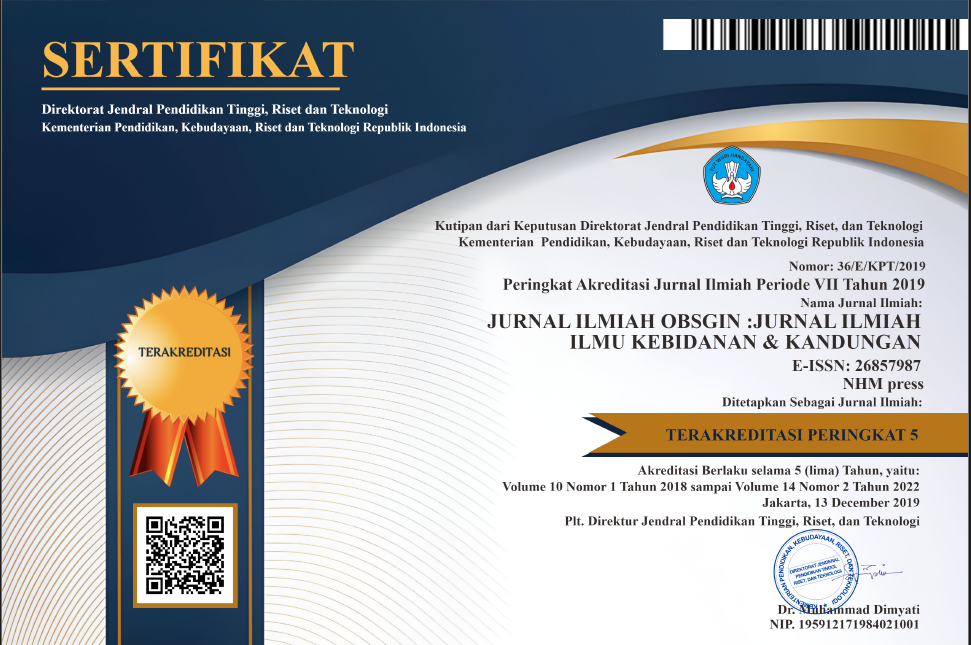PERILAKU WANITA USIA SUBUR DALAM MERAWAT DAN MENJAGA KESEHATAN REPRODUKSINYA SELAMA PANDEMIK COVID-19 DI KOTA MANADO
Abstract
Indonesian women are at risk of various health problems during this covid-19 pandemic. This study aims to examine the behavior of women of childbearing age in caring for and maintaining their reproductive health during the Covid-19 pandemic in Manado City
This research is a quantitative study with a cross-sectional survey design. This research was conducted in Manado city during December 2021. The study population was women of childbearing age in Manado City. The sample of this study used a minimum number of samples from an unknown population. using a power analysis table and getting a minimum sample size of 100 respondents. The sampling technique that will be used in this study is purposive sampling. The instrument of this research is a questionnaire consisting of closed questions which were adopted from the research of Widiasih et al in 2018. The research questionnaire was distributed to respondents in google form. forms.
The results show that during the COVID-19 pandemic, most of the respondents (87.4%) did not participate in the family planning program. most of the respondents (89%) did not control contraception. The results of the study on early detection of breast cancer and cervical cancer showed data that 41% of respondents had never done breast self-examination and 49% of respondents did not routinely do breast self-examination and 52% knew the signs of cervical cancer as well. The results of the study on women's efforts to prevent infectious diseases showed that 52% of respondents did not perform vaginal examinations themselves.
The results showed that during the COVID-19 pandemic WUS did not participate in family planning programs. Lack of effort in maintaining reproductive health and lack of participation in early detection of cancer in the reproductive system. Therefore, optimizing the use of telehealth, increasing health literacy can encourage women to improve their behavior in caring for reproductive health during the COVID-19 pandemic
References
Kemenkes RI (2019) Profil Kesehatan Indonesia 2018 [Indonesia Health Profile 2018]. Available at: http://www.depkes.go.id/resources/download/pusdatin/profil-kesehatan-indonesia/Data-dan-Informasi_Profil-Kesehatan-Indonesia-2018.pdf.
Kemenkes RI (2020) PERATURAN MENTERI KESEHATAN REPUBLIK INDONESIA NOMOR 9 TAHUN 2020 TENTANG PEDOMAN PEMBATASAN SOSIAL BERSKALA BESAR DALAM RANGKA PERCEPATAN PENANGANAN CORONA VIRUS DISEASE 2019 (COVID -19). Jakarta: KementerianKesehatan RIt.
Lindberg, L. D., Bell, D. L. and Kantor, L. M. (2020) ‘ The Sexual and Reproductive Health of Adolescents and Young Adults During the COVID ‐19 Pandemic ’, Perspectives on Sexual and Reproductive Health, 52(2), pp. 75–79. doi: 10.1363/psrh.12151.
Taylor Riley, Elizabeth Sully, Z. A. and A. B. (2020) ‘Estimates of the Potential Impact of the COVID-19 Pandemic on Sexual and Reproductive Health In Low- and Middle-Income Countries’, International Perspectives on Sexual and Reproductive Health, 49.
UNICEF (2020) Maternal and newborn health and COVID-19. UNICEF Data.











